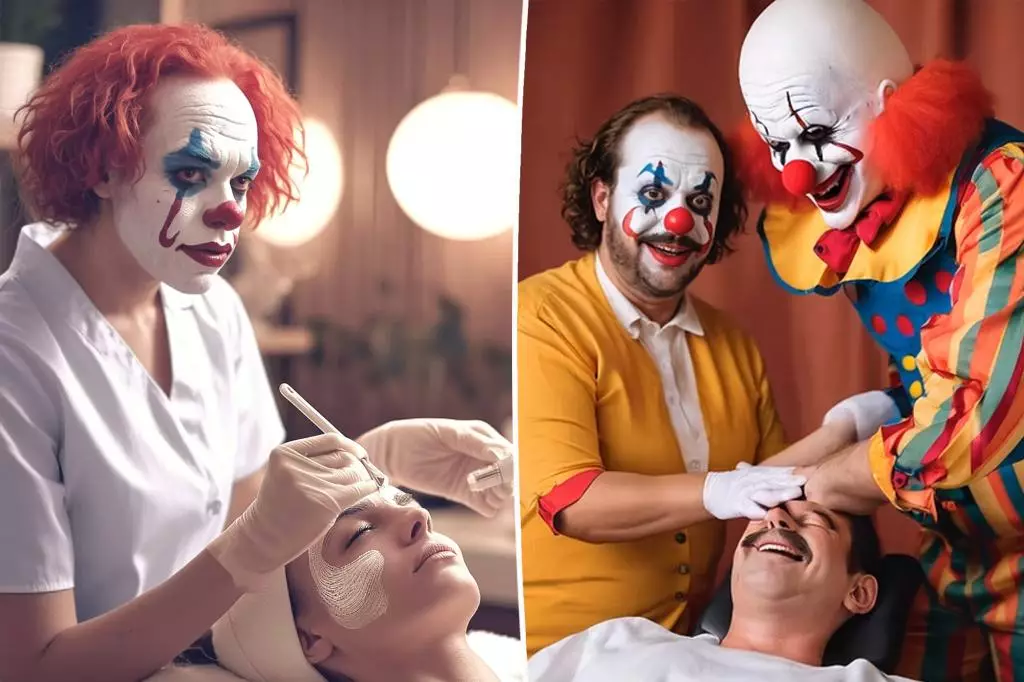The Hamptons summer season is often synonymous with exclusivity and the pursuit of high-end wellness experiences. Amidst the elite yoga retreats and lavish spa treatments, an unexpected and rather absurd disruption has emerged: “East Hampton Clown Massage.” This elaborate prank, shrouded in humor and satire, serves as a hilarious critique of contemporary wellness culture, all while delivering a poignant commentary on society’s quest for unconventional healing methods.
This tongue-in-cheek initiative leverages the eccentricity of clowning as a metaphor for the proliferation of wellness. Naively perceived as frivolous, the notion of clown-based healing rituals indeed strikes a chord because it embodies the absurdity lurking beneath the polished surface of elite wellness branding. Who wouldn’t chuckle at the image of a clown offering a beachside massage while promoting joy and laughter as transformative tools for mental health? It seems to be both a clever mockery and an insight into what it means to seek fulfillment in unique ways, often enveloped in a glossy façade that is indicative of modern consumerism.
The Art of Satire in Healing
The creators behind East Hampton Clown Massage are evidently highly knowledgeable about the cultural nuances and eccentricities of the Hamptons. Their clever satire targets the superficial layers of the “wellness” industry, yet it goes far deeper than mere laughter; it challenges patrons to reflect on the absurdity of some of the overly commodified and sometimes questionable wellness trends. Consider the so-called treatments like “Scream, Tummy Tickle,” and “Joeky Reiki Bakey.” These playful names implicitly highlight how some wellness practices could border on the ridiculous—an observation all too necessary in a world where people are often willing to pay exorbitant sums for seemingly magical solutions.
The inclusion of fictitious celebrity testimonials adds another layer to the farce, poking fun at the culture of influence and the ever-present allure of A-list endorsement in wellness ventures. Creating personas like “Giggles” and “Krusty” makes the parody relatable while mocking societal tendencies to equate celebrity with authenticity. Through this narrative framework, the creators ask us to consider: how do fame and reputation impact our perceptions of health and healing?
In Character: A Peek into Clownish Psyche
Responses from the mastermind behind “Joeky” further enrich this satirical landscape. Positioning clown massage as an art form that contributes to physical, spiritual, and emotional well-being, he cleverly invokes the kind of serious language often found in genuine wellness rhetoric. This juxtaposition of jest with earnestness prompts an exploration of when humor becomes a legitimate therapeutic tool and how laughter can indeed facilitate healing.
The ambiguous response to inquiries about the identity of their creators adds another layer of intrigue to this performance art. It is as if this prankster community is not just a single actor but a collaborative ensemble reflecting on wellness while challenging its authenticity. The real art lies not only in the humor but in the community spirit echoed in their collective efforts to confront a culture that often feels detached from reality.
Cultivating Joy in a Chaotic World
Despite the seemingly frivolous endeavor, the clown massage phenomenon resonates during a time of heightened anxiety and cultural uncertainty. It acts as a reminder that humor has a vital role in our coping mechanisms. In a society craving authenticity and relief, this prank goes beyond mere entertainment; it prompts a real conversation about the lengths to which people will go to feel whole. Behind the jovial façade lies a message about healing through laughter and the importance of not taking life—or ourselves—too seriously.
In the quest for wellness, one can periodically lose sight of simple joys, opting instead for extravagant escapades that promise relief from life’s chaos. The playful nature of the East Hampton Clown Massage suggests that perhaps, amidst elite retreats and self-care fads, rediscovering the joy in silliness may offer the most meaningful benefit of all, transforming how we view not just wellness but the fabric of our lives themselves. Who knew that embracing one’s inner clown could lead to profound reflections on happiness amidst life’s relentless pressures?
